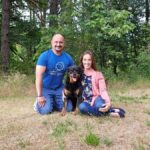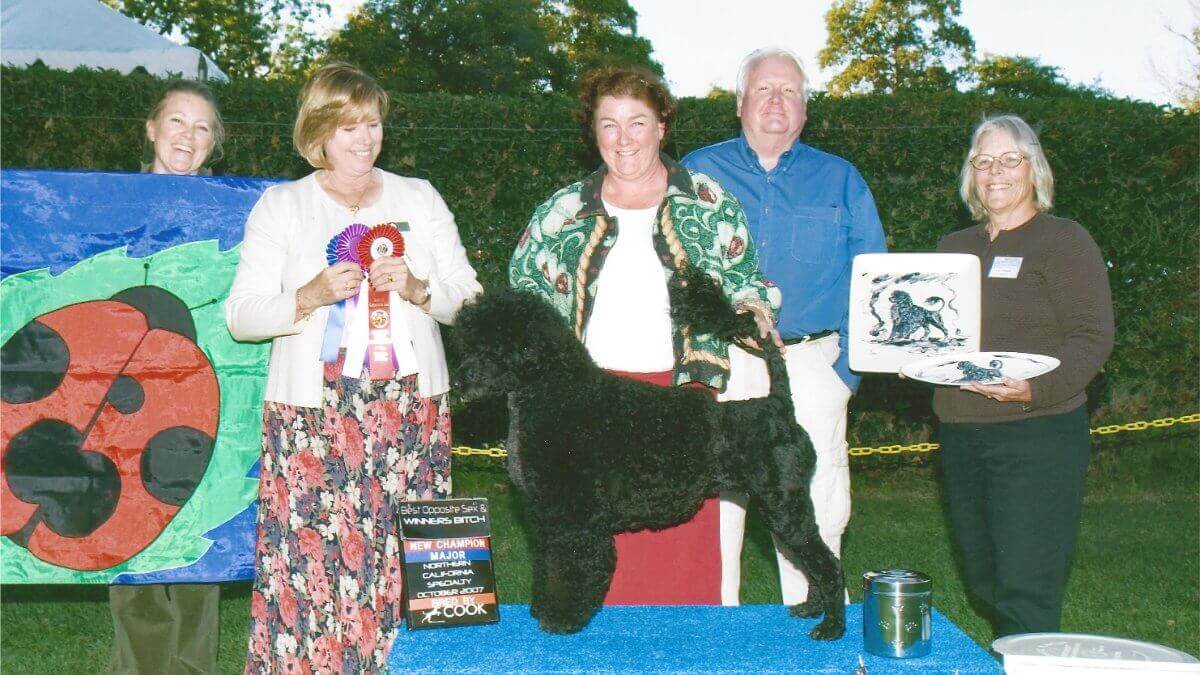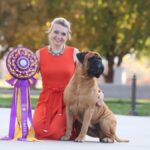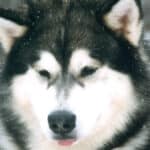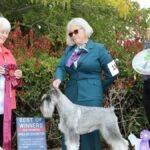Interview with Cathy & Mike Dugan, Breeders of Aviator Kennel Portuguese Water Dogs
- Please tell us a little bit about yourself. Where do you live? How many years in dogs? How many years as a breeder? What is your kennel name?
- What is your “process” for selecting show puppies? Performance puppies?
- In your opinion, is your breed in good condition overall? Any trends that warrant concern?
- As a Preservation Breeder, can you share your thoughts on the sport today? How’s the judging these days? What do you think about the number of shows?
- In your opinion, is social media good for the sport? Is it harmful?
- What are the biggest challenges facing the dog show community as a whole today and how can these be addressed?
- What are some of the positive changes you’ve seen in the sport over the past decade?
Cathy & Mike Dugan:
1. Aviator Kennel has been breeding champion dogs since 1987; exclusively Portuguese Water Dogs (PWDs), for the last 25 years. Located in Northern California in the Sierra Foothills near Sacramento, Aviator is a Preservation Breeder, AKC Breeder of Merit – Platinum (over 150 champions), with nearly 200 champions worldwide. We have placed PWDs in the US, Canada, England, Portugal, Germany, Denmark, France, South Africa, Brazil, China, and Australia. We have had the No. 1 PWD in Australia and England, and downline from Aviator, PWD “Cash” won the World Dog Show in Geneva, Switzerland, in 2023. Aviator was named the AKC Best Working Breeder in the US in 2021.
2. In any litter, there are puppies that stand out and demand your attention. The way they move, interact with their fellow puppies, and show confidence and bravado even with adult dogs in their home. Litter evaluations with other breeders also provide information about the quality of each pup.
3. PWDs are in very good condition as a breed, with more and more breeders committed to complete health testing and careful breeding practices to ensure consistent breed improvement. Enhancing diversity through “cross pollination” by trading DNA to improve overall quality has become more common. Ten years ago, Aviator sent three males to England, Germany, and Portugal to fellow breeders with the intent to get back puppies from future breedings. Those breedings produced multiple champions throughout Europe as well as here in the US. It also expanded the DNA as well as re-introducing one of the original PWD lines, the Algarbiorum, which had disappeared during the Portuguese Civil in 1975. Many other breeders have followed suit since then, enhancing the breed.
4. The PWD breed has recovered very well since the disaster of COVID. A new generation of judges, supported and nurtured by veteran judges, adhere to the highest AKC breed standards in the ring. Shows are coming back, but the economics of sustaining dog shows remain a real challenge because of rising costs.
5. As with the rest of society, social media has been a mixture of curses and blessings. For the sport of dog competition, social media has been a positive influence because the vast majority of participants have been responsible and respectful. It’s a small family where everyone knows each other and, by and large, supports each other.
6. Two major challenges exist for the dog show community. First, rising costs for shows, breeding, judging, and handlers have made the price of entry to the community cost-prohibitive for many new people to the sport. Second, “passing the baton” to new people is a responsibility and a mandate for veterans in the sport. For example, new AKC standards and training to protect and encourage Junior Handlers is a great start.
7. Improved inclusion and diversity have made dog competitions better known to the general public as a major international sport. Broader TV coverage, not only of Conformation events but also for other competition formats, has greatly improved interest, as the public realizes the dog community and purebred dogs are for everyone.
